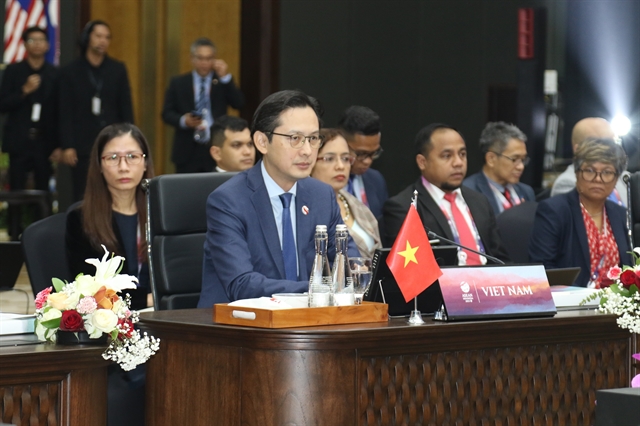 Politics & Law
Politics & Law

 |
| Deputy Minister of Foreign Affairs Đỗ Hùng Việt attends the ASEAN Foreign Ministers’ Meeting in Jakarta on Monday. — VNA/VNS Photo |
HÀ NỘI — Deputy foreign minister Đỗ Hùng Việt on Monday attended the ASEAN Foreign Ministers’ Meeting in Jakarta, emphasising the bloc’s role as the epicentre of peace, security, cooperation and prosperity in the region.
The ASEAN foreign officials also attended the ASEAN Political-Security Community Council (APSC) and the ASEAN Coordinating Council Meeting (ACC) on the same day.
Speaking at the events, Deputy FM Việt expressed support for Indonesia’s practical initiatives as the current ASEAN chair, which contributed to the bloc’s long-term vision.
Economic priorities have also contributed to growth in trade, investments, financial stability and economic recovery in the region.
The Vietnamese official also shows appreciation for ASEAN’s efforts in climate change response and sustainable development, including the establishment of the ASEAN Centre for Climate Change and the ASEAN Coordinating Centre for Transboundary Haze Pollution Control.
He said that Việt Nam is ready to work with other countries in effectively promoting economic growth through marine economy, digital and green transformation for the interests of people and businesses.
The Vietnamese deputy foreign minister stressed that it is necessary to promote dialogue and consultation, as well as uphold international laws in addressing differences and conflicts in international relations.
The roles of ASEAN agencies also need to be strengthened for better response to challenges in marine security, cyber security, artificial intelligence, transnational crimes, sea pollution and water security, he added.
Deputy foreign minister Việt also underlines the ASEAN’s stance on the East Sea (internationally known as the South China Sea), and the countries’ role in building a peaceful, safe and stable marine region.
ASEAN also needs to stand by its principle of non-interference, providing support to Myanmar for comprehensive and feasible solutions for the current situation, while also encouraging dialogues, building trust and reducing differences, he said.
Positive results
The ASEAN Political-Security Master Plan 2025 has been on schedule with 286 out of the total 290 action lines finished, a completion rate of 99 per cent.
During the APSC meeting, delegates discussed marine and security cooperation, emphasising the role of ASEAN in maintaining an open, transparent, inclusive and rules-based regional structure.
Meanwhile, the ACC meeting focused on standardising procedures to ensure comprehensiveness and coordination between ASEAN agencies.
Speaking at the opening ceremony, Indonesian foreign minister Retno Masurdi called for cooperation from the bloc’s member countries in face of the challenges in the region.
Noting the efforts in building the ASEAN Community and in preparing for the ASEAN Community Vision 2045 as part of the ASEAN Concord IV, Retno said the bloc continues taking a lead in shaping the regional dynamics and ensuring a peaceful and inclusive Indo-Pacific region.
The bloc has also demonstrated its role when there are an increasing number of countries joining the Treaty of Amity and Cooperation in Southeast Asia (TAC) and becoming partners of ASEAN, she said, adding that this shows ASEAN’s convening power and wide acceptance of ASEAN’s norms and values.
On the same day, ASEAN country representatives witnessed the signing of the Instruments of Accession to the Treaty of Amity and Cooperation in Southeast Asia (TAC) by Panama, Serbia and Kuwait, bringing the number of High Contracting Parties to the TAC to 54.
The foreign ministers conducted a comprehensive review on the implementation of the five-point consensus on the Myanmar issue, which resulted in a recommendation that will be submitted to the 43rd ASEAN Summit taking place from September 4-7. — VNS




